|
|
|
Sort Order |
|
|
|
Items / Page
|
|
|
|
|
|
|
| Srl | Item |
| 1 |
ID:
159777
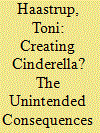

|
|
|
|
|
| Summary/Abstract |
In 2000, the United Nations (UN) launched the Women, Peace and Security (WPS) agenda by adopting Security Council Resolution 1325. The agenda, among other things, called for the greater inclusion of women in peace negotiation practices and structures. While the European Union (EU) has made commitments to implementing the WPS agenda, the literature has not yet captured the institutional dynamics of the EU as it seeks to translate the WPS agenda into reality. This article takes stock of this hitherto excluded area of research. It argues that mediation is the ‘Cinderella’ of the EU’s peace and security institution because it has been ignored as a site for the implementation of the WPS agenda with important implications. Using a feminist institutionalist framework, the article shows the ways in which institutional practices of change aimed at including the new perspectives prompted by the WPS agenda lead to unintended gendered consequences.
|
|
|
|
|
|
|
|
|
|
|
|
|
|
|
|
| 2 |
ID:
159775
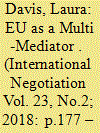

|
|
|
|
|
| Summary/Abstract |
In the 1990s, the Democratic Republic of Congo (DRC) experienced complex wars involving local, national and regional combatants and conflict drivers, which formally ended in 2002. Violence continued and the government and rebel groups negotiated a series of peace deals, most recently in 2013. The European Union (EU) has been engaged in the DRC since the 1990s. This article proposes a model for conceptualizing EU mediation engagement within the conflict and process contexts, and the necessary capabilities for different types of EU mediation. It uses the DRC case study to examine how different EU capabilities were engaged in various peace processes which addressed multiple layers of a complex situation, and also engaged with other external actors in a multilateral environment. It concludes that the EU can be conceptualized as a multi-mediator and identifies the necessary capabilities for this.
|
|
|
|
|
|
|
|
|
|
|
|
|
|
|
|
| 3 |
ID:
159776
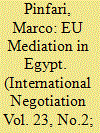

|
|
|
|
|
| Summary/Abstract |
This article reviews EU’s mediation attempts in Egypt between 2011 and 2013. After presenting the main challenges and opportunities of EU mediation in the Middle East-North Africa (MENA) neighborhood, EU interventions in Egypt are discussed in relation to the 25 January 2011 revolution, during the presidency of Mohammed Morsi, and after the 3 July 2013 coup d’état, focusing specifically on the choice of mediation styles and their timing. It is argued that three contextual conditions that are typical of the crises that erupt during failed democratic transitions – their fast pace, their eminently domestic nature and significant power asymmetries between the main parties involved – exacerbate the structural problems that the EU faces when intervening in countries that are not current or potential candidates for accession. The analysis of EU mediation styles during Egypt’s transition provides a critical perspective on EU’s foreign policy making after the Treaty of Lisbon.
|
|
|
|
|
|
|
|
|
|
|
|
|
|
|
|
| 4 |
ID:
159780
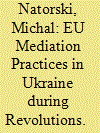

|
|
|
|
|
| Summary/Abstract |
This article compares two different experiences of EU engagement in mediation in Ukraine: the Orange Revolution in 2004 and the Euromaidan crisis in 2013–2014. This comparison reflects two different outcomes of EU mediation practices under similar circumstances of political conflict between domestic political actors. The changing degree of collective EU authority recognized by other actors is the main driver behind varying EU mediation practices and outcomes. Authority conferred on the EU as a collective actor represents the legitimacy of its power, resources and competence to conduct mediation. However, such authority is always circumscribed by crisis-specific circumstances and volatile configurations of forces. Therefore, differing degrees of authority explain shifts in the effectiveness of EU mediation. To capture the authority of EU mediators in specific crisis situations, this article employs and interprets firsthand accounts of the experiences of actors directly involved in mediation.
|
|
|
|
|
|
|
|
|
|
|
|
|
|
|
|
| 5 |
ID:
159774


|
|
|
|
|
| Summary/Abstract |
In this introductory article of the special issue, we examine European Union (EU) mediation practice and identify different conceptual and empirical perspectives from which it can be analyzed. We present different understandings of mediation in research and practice a definition and conceptual clarification of EU mediation practice, and offer a definition that covers mediation efforts and mediation support activities. Then, the institutional architecture for EU mediation activities is presented. Next, the focus of this special issue is examined and research questions that have not yet been sufficiently addressed in existing research of EU foreign policy and mediation are discussed. Based on these questions, we offer several fruitful avenues for studying EU mediation: examining the drivers of EU mediation, EU mediation roles and strategies, and EU mediation effectiveness. Finally, we provide an overview of the contributions to this special issue is presented.
|
|
|
|
|
|
|
|
|
|
|
|
|
|
|
|
| 6 |
ID:
159779
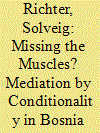

|
|
|
|
|
| Summary/Abstract |
In October 2009, the European Union, in conjunction with the United States, launched a high-level mediation effort in Butmir, Bosnia and Herzegovina, to reform the political structure of the state. Since 2005, the constitution which was included in the Dayton Peace Accord has been widely perceived as dysfunctional. In two negotiation rounds, the EU and the US put a comprehensive proposal on the table and showed strong leverage. However, the talks ended without a tangible result. To explain this failure, a theoretical model is developed based on both mediation and Europeanization literature to explore mediation by conditionality as a type of ‘directive mediation’ in a systematic way. Contrary to the argument that the EU lacked muscle, it is argued that pre-conditions for political conditionality were not fulfilled and strong leverage proved ineffective and counterproductive. These results question conditionality as an effective mediation strategy when state-building is contested between local parties.
|
|
|
|
|
|
|
|
|
|
|
|
|
|
|
|
| 7 |
ID:
159782


|
|
|
|
|
| Summary/Abstract |
This article concludes this special issue on the European Union as international mediator that set out to advance our theoretical and empirical knowledge about EU mediation. Providing a comprehensive reflection of EU mediation activities and the diverse settings where they take place, this concluding article identifies some connection points between the articles and discusses their findings on the motives/drivers, roles/strategies, effectiveness and institutional capacities of EU mediation. It discusses the implications of these findings for policymaking, focusing on the conditions for EU mediation effectiveness, the advantages of the multi-layered nature of EU mediation and the need for flexible adaptation of mediation strategies. Finally, the article sets the scene for future research endeavors on EU mediation by identifying three future research avenues that focus on the politics, domestic effects and comparative advantage of the EU as international mediator.
|
|
|
|
|
|
|
|
|
|
|
|
|
|
|
|
| 8 |
ID:
159781
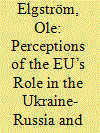

|
|
|
|
|
| Summary/Abstract |
This article focuses on how the European Union’s (EU) mediation activities during the Russia-Ukraine and Israel-Palestine conflicts are perceived by local elites. Our analysis is based on recent interviews with decision makers in Ukraine, Israel and Palestine. Consistent with this special issue, we investigate perceptions of EU roles, strategies and effectiveness. We suggest that the EU’s relation to the parties may affect their perceptions of EU conflict mediation efforts. Specifically, we expect that the EU is perceived as a biased mediator in both cases due to perceived close relations to one or more conflict parties. However, contrary to our expectations and widespread assumption in mediation theory, while such a bias exists, we found it is not perceived as a main cause of EU ineffectiveness. Other factors, including the prominence of other mediators and internal EU disunity, are perceived as more detrimental to EU efficacy.
|
|
|
|
|
|
|
|
|
|
|
|
|
|
|
|
| 9 |
ID:
159778


|
|
|
|
|
| Summary/Abstract |
This article compares UN and EU mediation practice in the Kosovo-Serbia conflict. It proposes a conceptual framework to analyze mediation effectiveness and its conditions and applies it to the UN-led Kosovo Status Talks in Vienna (2006–2007) and the ongoing EU-facilitated dialogue between Belgrade and Pristina (since 2011). The EU’s relatively high degree of effectiveness compared to the UN effort can be partly explained by the application of a strategy of manipulation, drawing on the EU’s strong leverage vis-à-vis both sides; partly by pointing to the conflict context which has been more favorable to mediation since 2011. At the same time, the analysis reveals that EU mediation has not led to any changes concerning Serbia’s stance toward the recognition of Kosovo’s independence. The continuing non-resolution of the conflict demonstrates the limits of the EU’s manipulative mediation approach and points to a substantial dilemma of EU mediation.
|
|
|
|
|
|
|
|
|
|
|
|
|
|
|
|
|
|
|
|
|